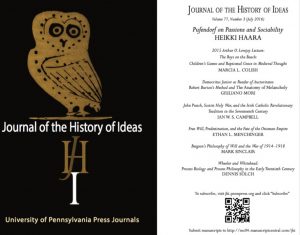Haara, Heikki (2016) “Pufendorf on Passions and Sociability.” Journal of the History of Ideas 77 (3): 423–444.
The article explores the role of passions in Samuel Pufendorf’s theory of sociability and his description of the structure of human societies. Given that one of the central themes in early modern moral and political thought was how passions must be controlled and redirected, it is striking how little attention Pufendorf’s notions on passions have received in modern scholarship. The article shows that Pufendorf conceived passions as a constant threat to peaceful social order, and yet as valuable, even indispensable aspect of sociable life. While Pufendorf denies that postlapsarian human beings could be directly responsive to the moral norms through the passions, he was well aware of the passions as a source of motivation for the promotion of sociability. Suitable emotional reactions provide crucial motivational underpinnings to natural law. The article argues that the norms of sociability become operative in social life because social interaction, guided by political governance, enables the moderation of antisocial passions and habituation of sociable emotional dispositions.
https://muse.jhu.edu/article/626909

